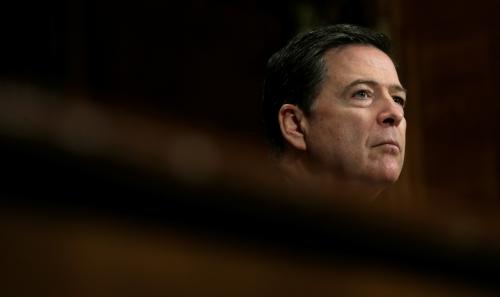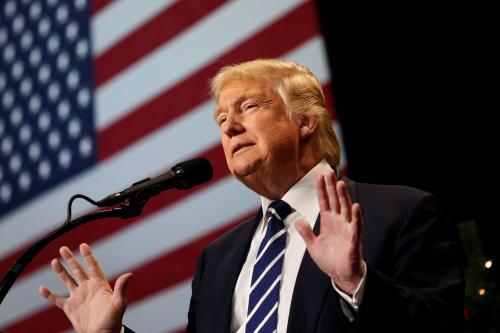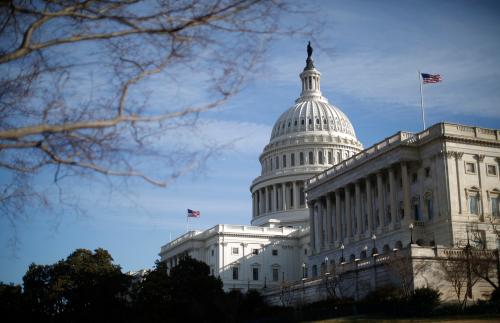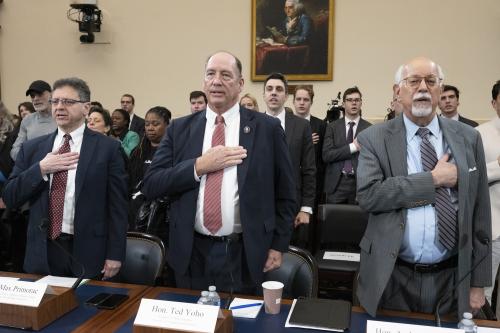When Michael Cohen testifies before the House Oversight Committee this week, he will inevitably draw comparisons to another lawyer in another era—John Dean, President Nixon’s White House Counsel who testified before the Senate Watergate Committee in June of 1973.
When Dean testified, a cloud hung over the Nixon presidency since the infamous break-in at the Democratic National Committee’s offices in the Watergate the summer before. At the time of the break-in, Dean had been White House Counsel for two years, a position of great prominence for someone just 33 years old. Like everyone who joins the White House staff and finds themselves in proximity to the most powerful person in the world, the young Dean was at once elated and terrified. His book Blind Ambition, published in 1976, is a fantastic read—an honest accounting of how a boy wonder ended up disbarred and in jail. “Slowly, steadily,” he wrote, “I would climb toward the moral abyss of the President’s inner circle until I finally fell into it, thinking I had made it to the top just as I began to realize I had actually touched bottom.”[1]
Dean’s testimony took days, during which the country was glued to their television sets. Dean connected the dots between a “third-rate burglary,” as President Nixon referred to Watergate, and the activities of CREEP—the sarcastic shorthand for The Committee for the Re-Election of the President. And yet, while the testimony itself was dramatic, it was only the word of one young man against the President of the United States. That is why, when the existence of a taping system in the Oval Office was confirmed, Dean breathed a huge sigh of relief. Dean recalls telling Sam Dash, Chief Counsel for the Senate Watergate Committee, “Sam, do you know what this means, if you can get those conversations?… It would mean my ass is not hanging out there all alone. It means that you can verify my testimony.”[2]
It remains to be seen whether Cohen’s testimony will begin the final unraveling of Mr. Trump’s presidency in the way that Dean’s testimony did for President Nixon. As in Watergate, the current presidential scandal features a lot of suspicions, a lot of perjuries, and a lot of disgraced campaign and White House aides, but nothing that implicates the president himself. And there may not ever be.
So why testify?
Cohen is seeking nothing more and nothing less than to rescue his reputation and his place in history. John Dean spent four months in jail before his sentence was changed to time served. Although he was disbarred, he spent the following decades as an investment banker and he also wrote books, many of which were critical of Republican presidents. And these days you will still see him on television, commenting on the many parallels between the cloud around President Trump and the cloud around President Nixon. As awful as going to jail is for anyone, life has not been too bad for John Dean.
If Cohen wants to aim for a similarly respectable place in public life, it could be a tougher sell. Cohen is a convicted felon who has been sentenced to three years in prison, where he is scheduled to report on March 6. He was found guilty on two counts. The first was lying to Congress about the timing of the discussions of a proposed Trump Tower in Moscow—they extended into the 2016 campaign. The second was arranging payments to two women during the campaign to cover up affairs with Trump: a former adult film star and a former Playboy model.
Who knows how much light Cohen will shed on the many suspicious links between Trump and Russia. But one thing we do know is that, like Dean before him, Cohen will be taking the difficult but necessary steps to try and regain some respectability. In fact, Cohen’s lawyer, Lanny Davis has reached out to John Dean for advice. Like Dean, Cohen has credibility issues. Dean was at the inception of the cover up. Cohen has lied to Congress in an effort, now apparently abandoned, to protect the president. He cannot lie again without facing even greater punishment from the federal legal system.
At his sentencing, Cohen became emotional talking about the pain and shame he brought his family. Here are some of his more passionate statements from that day:
“I am committed to proving my integrity and ensuring that history will not remember me as the villain of his story.”
“This may seem hard to believe but today is one of the most meaningful days of my life. I have been living in a personal and mental incarceration ever since the day that I accepted the offer to work for a real estate mogul whose business acumen that I deeply admired.”
“Recently, the President tweeted a statement calling me ‘weak,’ and he was correct, but for a much different reason than he was implying. It was because time and time again I felt it was my duty to cover up his dirty deeds rather than to listen to my own inner voice and my moral compass.”
At the very least, Cohen will proffer the nation a very big mea culpa. Whether he will bring down a president, now or in 2020, remains to be seen. But he obviously hopes to live to a ripe old age and spend 2046 telling cautionary tales to some other president who is in deep trouble.
[1] (New York, Simon and Schuster, 1976) page 31
[2] Ibid, page 332
The Brookings Institution is committed to quality, independence, and impact.
We are supported by a diverse array of funders. In line with our values and policies, each Brookings publication represents the sole views of its author(s).








Commentary
Why is Michael Cohen testifying against Trump? A key Watergate figure may hold the answer
February 26, 2019